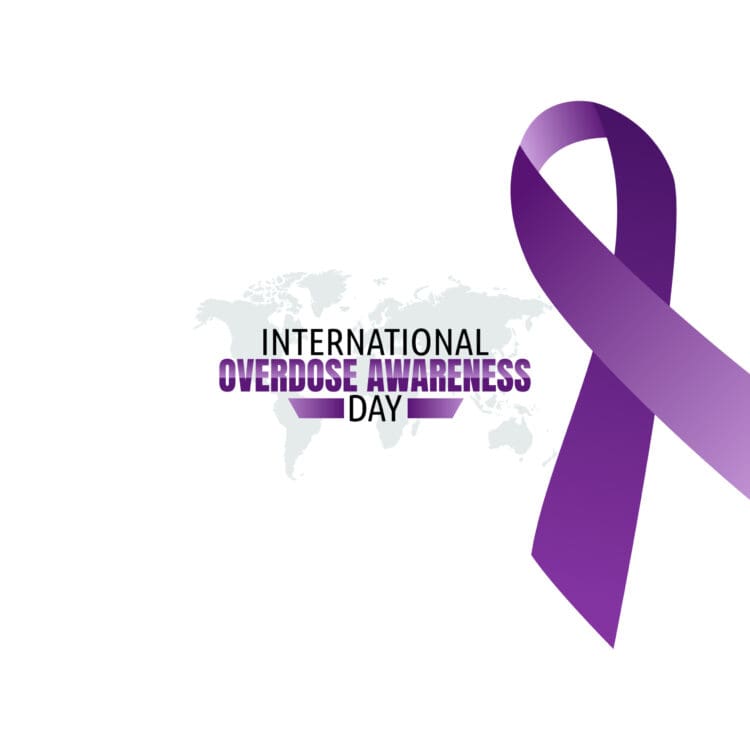On August 31, St. Gregory Recovery Center in Iowa observes International Overdose Awareness Day (IOAD), the world’s largest campaign to lower and eliminate deaths by overdose. It’s also a day to remember all those who were directly and indirectly affected by an overdose and the possible death or complications that it triggered.
IOAD’s roots are Australian. Sally J Finn created IOAD over twenty years ago at The Salvation Army branch in Melbourne. Her main motive was to raise awareness around the dangers of opioid use and overdose in both government and non-government communities. She was also committed to commemorating everyone who lost their life to an overdose, along with the people who were left behind. It’s a day that serves to break down the stigma around substance use disorder (SUD) and encourage people to seek help for addiction and get educated about the reality of living in a world where opioid use is rampant and lethal.
We observe IOAD at each of our Des Moines and Bayard locations because our residential treatment programs for substance abuse share the same goals as this campaign. We want to break down barriers to treatment, helping others to see that SUD and substance abuse overall are mental health issues, not the result of a personality defect or poor morals and values.
What Sparked The Overdose Awareness Campaign?
In North America during the 90s and early 2000s, a wave of poor pharmaceutical prescription practices triggered the start of an opioid/overdose crisis. This caused a second wave of heroin abuse, as people became addicted to their prescription medications and began to seek out heroin when they could no longer access the mediation. The demand for heroin led to the drug being laced with fentanyl, an incredibly strong, often lethal synthetic opioid.
In 2022, almost 108,000 people in the U.S. died of a drug overdose. Opioids like heroin caused more than half of those deaths and over a quarter involved synthetic opioids like fentanyl, methadone, codeine, and morphine. Over the past two decades, overdose deaths from cocaine and psychostimulants (such as prescription medications that treat ADHD) also continue to climb.
These stats touch every American in some way, as overdose rates for both men, women, and minority groups are up. This means that the job market, the healthcare system, first responders, police efforts, family structures, prison systems, and children with addicted parents all take a hit.
To bring it home to Iowa, in 2022 approximately 15 out of 100,000 people died of an overdose. While this is a devastating loss, Iowa is in better shape than many of its surrounding states: Missouri, Wisconsin, and Illinois all have an overdose death rate of almost double Iowa’s.
How To Make The Most of International Overdose Awareness Day in Iowa
When you contact us today, we can provide you with all the resources you need to make the most out of IOAD this August. In the meantime, you can reflect on and search for information on how to do the following:
- Foster and protect spaces where people can publicly and safely mourn loved ones lost to overdose without being shunned or shamed.
- Encourage the people whom you’re connected with to take part in IOAD—regardless of their ethnic, religious, racial, or cultural backgrounds.
- Find and spread verifiable information about lethal and nonlethal overdoses.
- Find and spread verifiable information on recovery, relapse and overdose prevention, and mental health services that see people who used or who are currently using drugs as valuable members of society who need support.
- Refer others to our recovery center, where we work to educate, prevent, and reduce the harm that SUD creates with scientifically supported approaches.
- Spread the word that overdose risks are high and continually threaten the American public.
Another important step for recovering people and their families and friends to take in overdose prevention is seeking out cognitive behavioral therapy (CBT). This therapeutic method is highly effective in maintaining sobriety and helps train your brain to cope without substances that could compromise your health and life. No matter what: don’t forget that St. Gregory Recovery Center is here for you on your best and worst days!











